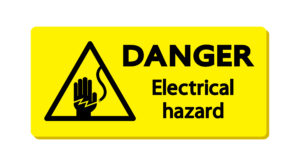Due perhaps to the invisible nature of electricity, many are perplexed as to what causes electrocution, what increases the risk of being shocked, and how it can be avoided. In this article, we will debunk some of the myths around electrocution, discuss what you can do to keep yourself safe, and what you should do if you or a work colleague is electrocuted.
What is an electric shock?
Electric shock is the term used for the physiological response of the body to external electricity. The extent of any  damage caused depends upon a number of factors, including; if there is a presence of moisture, how much voltage is applied, the type of footwear being worn, the length of exposure, and where on your body you are shocked.
damage caused depends upon a number of factors, including; if there is a presence of moisture, how much voltage is applied, the type of footwear being worn, the length of exposure, and where on your body you are shocked.
Once electrocuted, electricity flows between two different parts of the body, interrupting the bodies own flow of electrical signals. This can lead to:
- Cardiac arrest or arrhythmia (an irregular heartbeat)
- Burns, both internal and external
- Impact injury due to the shock forcing you into the path of an object
- Muscle spasms
- Interruption of breathing
What causes electrocution?
Electricity has a natural tendency to want to flow to the ground, and it uses anything that will conduct an electrical current to do so. Unfortunately for us, humans contain a lot of water and sodium, which are conductive. Therefore, wearing rubber-soled shoes may offer some level of protection from electrocution, as the electricity cannot easily exit the bottom of your feet to the earth. This is also the reason that birds can sit on very high voltage power cables and not be harmed in the slightest – the electricity is not being grounded through the bird, so there is no shock.
The law and electrical safety
The Health and Safety at Work etc Act 1974 (HSW Act) places responsibility on employers for the health and safety of their staff, including electrical safety. In addition, the Electricity at Work Regulations 1989 aims to ensure that electrical systems are constructed, used and maintained in a manner that prevents danger. Only those who are suitably trained or have the necessary supervision should be allowed to work on or with electrical equipment.
It is very important that any cases of electrical accidents, such as short-circuits causing a fire, explosions, or equipment touching overhead power lines, are reported in compliance with the Reporting of Injuries, Diseases and Dangerous Occurrences Regulations 1995.
How can I ensure I am safe from electrocution at work?
There are many aspects of electrical safety that are outside of your control; however, as an employee you should ensure you:
- Observe all safety warning signs
- Implement any training that you are given in respect of electrical safety, including wearing protective equipment, reporting incidents and/or potential risks. This should include observing the Safe Working Practices – HSG85 published by the Health and Safety Executive (HSE), which covers in detail how those working with electricity should work methodically to mitigate the chance of electrocution
- Use a residual current device (RCD) if appropriate – this will ensure power is switched off in the event of a fault
- Proceed with caution if you observe a colleague being shocked by electricity. Do not touch them as you risk a shock yourself. You need to locate the power supply isolation switch in the first instance. If this is not possible, find a non-conductive item, e.g. a plastic or wooden pole, that can be used to separate the person from the power source. If there is water in the vicinity, be even more cautious as contact with the water could cause you to be shocked.
Can I claim compensation if I have been electrocuted at work?
Depending on the circumstances, you may receive financial compensation if you have been injured because of an electrical shock at work. To make a successful claim, we will need to establish a clear link between the negligence of your employer and the accident that occurred. Some accidents involving electricity can be life-changing, requiring considerable time off work or can even lead to the permanent inability to sustain employment. Financial compensation can make the difference between a stressful recovery and one whereby you have the knowledge that your finances are in order, allowing you to focus on your rehabilitation.
At Russell Worth Solicitors we specialise in personal injury claims. If you have been the victim of an electrical accident at work and would like a free claim assessment so that you can understand your rights, please call us now on 0800 028 2060 or complete our Online Claim Assessment.

